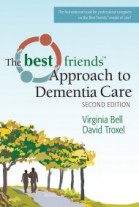
Imagine this new resident arriving at your memory care community or day center (or being supported in-home): a six-foot tall, 185-pound, 62-year-old man who is in great physical shape but has been diagnosed with frontotemporal dementia (FTD).
FTD affects more men than women, typically between 55 and 65. Classically, FTD affects the areas of the brain that influence personality and behavior. Personality change (even more than memory loss) is the telltale sign. People with FTD lose empathy and may become narcissistic. That’s why my nickname for FTD is “Me Me Me Me Me disease.” It’s all about them! As they lose social inhibitions, their behavior and comments may be inappropriate. “That’s an ugly dress.” “I don’t like you.” “You’ve gained weight.” Delusions of grandeur are common. So is a craving for sugar.
So back to our new resident or client. As a robust, younger person with dementia, he could be a major challenge if unhappy. He might be physically intimidating to staff, resist care and even take off on his own. How can you use the Best Friends™ Approach with your new resident?
We can start with his Life Story. Knowing that for many years, he managed a 5-star hotel in New York City, we can develop a game plan to help him feel safe, secure, and valued, while turning some classic FTD challenges into positive interactions. For example,
• address him as “General Manager” or “General Manager George”
• give him a clipboard, and ask him to approve menus, wallpaper samples, or make the rounds
• put his name and title on a plaque and point it out to him
• add some humor: “Good morning General Manager, Sonia reporting for duty.”
This approach helps with many kinds of dementia. Give a nurse a clipboard and ask her to help with assessment. Put a retired musician in charge of your evening concerts. Any time you draw on the Life Story, you give people purpose and help them feel needed.
Support his feelings of self-worth (and the ego that can come with FTD) by offering lots of praise and acknowledgement of his expertise:
• “Boss, this place is running ship shape thanks to you.”
• “General manager, would you give me some advice about today’s menu – what color dishes should we use?”
• “Thanks for being part of our team.”
When you work with a person with FTD, it’s important to help them feel a sense of control and self-worth. This can be a very challenging diagnosis for all involved but with a Best Friends philosophy someone like George may end up thriving in your care setting.

